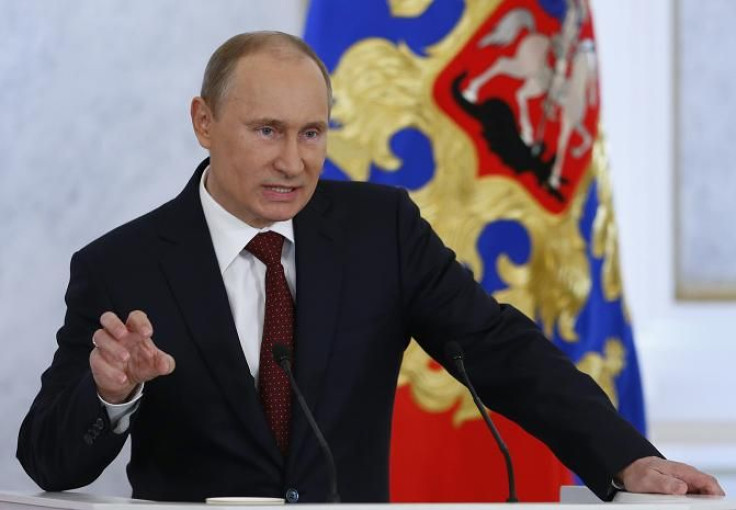Putin Supports Babies And Patriotism, Scorns Foreign Intervention

Patriotism was the word of the day for Russian President Vladimir Putin as he detailed his goals for the country in a major speech this week.
At the Kremlin ceremony on Wednesday, two guards opened two golden doors with a stylized flourish as the president walked in. Trumpets blared as he made his way on stage. Standing at a white lectern emblazoned with the seal of Russia, Putin delivered the first State of the Nation speech of his third presidential term.
“I would like to highlight some of the key aspects of our progress, questions that are fundamental for Russia’s present and future not only in the medium but also in the long term, the most basic issues for each and every one of us,” he said, according to a Kremlin transcript.
The speech focused on a need to strengthen Russia’s national identity – according to Putin, that will require more babies, better morals and less kowtowing to the international community.
Avoiding foreign impingements on Russian sovereignty was a theme that came up several times.
“Any direct or indirect foreign interference in our internal political processes is unacceptable,” he said. “Anyone who receives money from abroad for his or her political activities, thus serving certain foreign national interests, cannot be a politician in the Russian Federation.”
The president didn’t elaborate on those "foreign national interests," but it is a safe bet that Syria wasn’t far from his mind. The conflict represents one of the Kremlin’s sharpest points of contention with Western powers. Russia is staunchly opposed to foreign interference in the Syrian uprising, a humanitarian crisis which has seen rebels struggling to overthrow the regime of Bashar al-Assad for 20 months, with a cost of about 40,000 lives so far. But despite its geopolitical importance, Putin avoided any explicit reference to Syria in his speech.
The president was far less shy when it came to speaking out in favor of procreation. He urged Russian families to consider having more children, emphasizing his belief that “families with three children should become the standard in Russia” and promising to implement social programs that would make that easier for young families. It may sound like an odd policy priority – but for Russia, it makes sense. It is one of few countries where population has actually been on the decline for decades.
And once those babies are born, Putin hopes they’ll mature in an environment where good morals are held in high esteem.
“You cannot live without having regard for others, without helping the weak, without extending your responsibility beyond the responsibility of your family or profession,” he said. “Today more and more people in our country understand this. This has lead to the rise of civic engagement. People begin to relate their own lives and work with caring for others, with the aspirations of the entire nation and the interests of the state.”
Putin’s detractors might scoff at statements like that, since the president has come under fire for allegedly suppressing dissent and presiding over severe human rights abuses. An urban protest movement gained unprecedented strength after he ascended to office for a controversial third term this March; since then, several high-profile activists have been investigated, charged, arrested, and imprisoned. The international community – including the United States administration – has condemned these violations of the public trust.
Of course, Putin knows that not everything is coming up roses in his home country; he included a warning about Russia’s internal problems.
“If the nation is unable to preserve and reproduce itself, if it loses vital references and ideals, it does not need an external enemy because it will fall apart on its own.”
© Copyright IBTimes 2024. All rights reserved.












